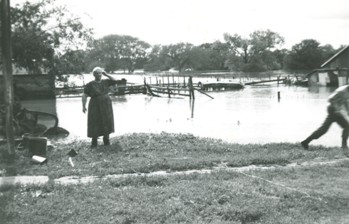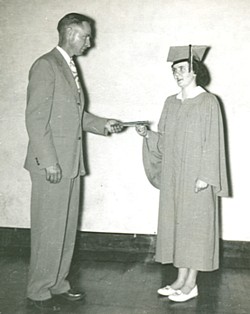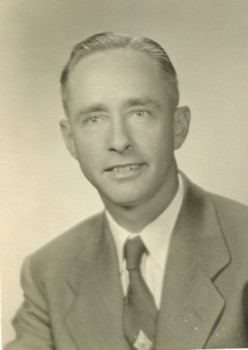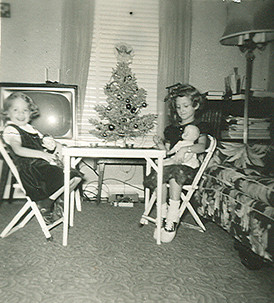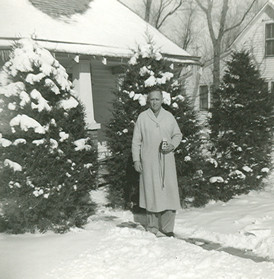|
For Meta the transition to Lehigh was stressful. She was in fifth
month of pregnancy with Ruth Elinor, who would be born on December
24, the day before Christmas, 1950. The Lehigh house was much smaller
than the farm house. It needed new wallpaper (stripes in the living
room and matching flowers in the dining room) and other furnishings.
Pipe lines had been laid to the house for Lehigh's new natural gas
system , but, as Meta wrote, "We are not connected because they ran
out of meters when they got to us." Neighborhood children--something
one didn't need to cope with on the farm--came into the house and
got in the way. The big Jantz family down the street, whose father
was "in prison for stealing chickens," seemed to be a problem. Meta
wrote to her sister Mary Ann Preheim, "We made a rule that Junior
and Janet couldn't go into their house and they couldn't come into
ours from now on." Mary Ann had recently moved from the small town
of Moundridge to the big city of Denver. "How did you do it?" Meta
asked. "It will probably take until Xmas until we're settled," she
wrote, "or longer."
New friends in Lehigh helped in the transition. Henry and Marie Guhr
invited the family for a wiener roast on moving day. Henry was director
of the Lehigh school board, a Bethel College grad and former Civilian
Public Service camp director, and operator of "Hank's Auto-Electric"
store downtown. He was one of the most supportive kindred spirits
in town. Peter W. ("Shiek") and Mary Goering lived two houses down
and also gave a warm welcome. Peter, originally from the Eden Mennonite
Church and Meta's second cousin, was pastor of the Lehigh Mennonite
Church and part time teacher of math, science and journalism at the
high school. Mary was, in Meta's judgment, "a very fine minister's
wife." She had met Peter at Hartford seminary and was, in the view
of some family members, a better preacher than her husband. The Goerings
had a small pasture and a milk cow, and sold milk and cream to the
Juhnkes at good prices. Their twin children, Peggy and Peter, were
the same age as Sharon.
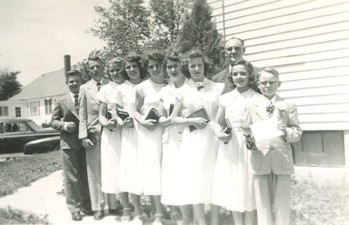
Lehigh Mennonite Church baptism class, Jim Juhnke second from the
left.
Rev. Peter W. Goering, pastor. Spring 1954.
The population of Lehigh in 1950 was 240 persons, less than half
the number who had lived there four and five decades earlier. The
first settlers had been nearly all German-speaking folk, mostly immigrants
from Russia. The town had grown along a branch of the Santa Fe Railroad
built in 1879 westward from Marion to McPherson. Near the McPherson
County line, the railroad took a short diagonal route. The streets
of Lehigh were laid out on the bias, as the locals boasted, "so the
sun can shine in from all sides of the house." As in all Kansas railroad
towns, the Lehigh skyline was dominated by tall grain elevators that
received, stored and shipped wheat grown in the fertile surrounding
farmland. In its thriving heyday, Lehigh had had more than forty business
and commercial establishments, two banks, a city jail, a broom factory,
and a printer that published three German-language periodicals. The
depression of the early 1930s had devastated the town. Some thirty
houses were abandoned or removed when owners could not pay their mortgages.
The town never recovered.
Lehigh in 1950 had three church congregations, all originally German
speaking. Two were Mennonite-Mennonite Brethren and General Conference
Mennonite. One was German Lutheran. A Seventh Day Adventist church
in Lehigh, also with members who had immigrated from Russia, had closed
its doors in 1943. By 1950 the Mennonite Brethren and Lutheran churches
were declining rapidly. They closed in 1953 and 1956 respectively.
Lehigh's population continued to decline during the years the Juhnkes
were there, from 240 in 1950 to 178 in 1960. The signs of decline-abandoned
houses and lots-were all over the town. Meanwhile, Lehigh's economy
survived as a grain center and farmers market. A "Lehigh Booster Edition"
of the Hillsboro Journal Weekly (November 19, 1953) acclaimed Lehigh
as the "Wheat Storage Center of Marion County," with storage facilities
for 331,000 bushels of grain. The newspaper editorial stated, unconvincingly,
that "Lehigh's star has not faded."
|
